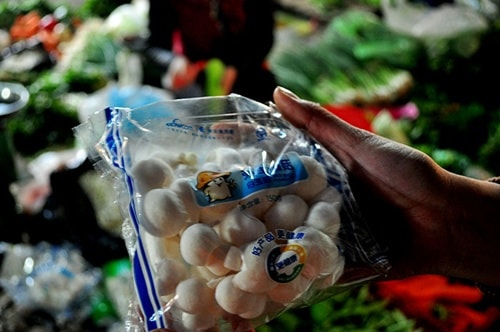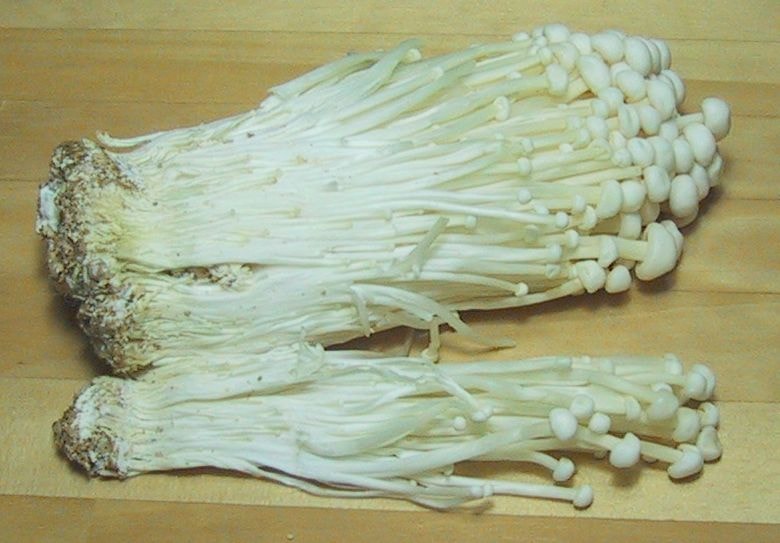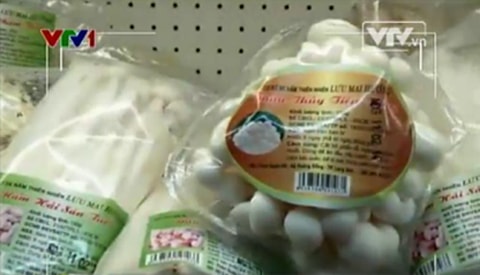Supermarkets recall mushrooms of unknown origin
There are many types of edible mushrooms of unknown origin being sold widely in markets and supermarkets in Hanoi.
Mushrooms are a delicious food, loved by many Vietnamese consumers. It is easy to find mushrooms such as enoki mushrooms, king oyster mushrooms... in supermarkets, markets and stores. According to a survey, while in 2013, on vegetable stalls in Vietnamese markets there were only 1-2 types of edible mushrooms, the beginning of this year witnessed an "explosion" of this type of food.
Most consumers trust and choose mushrooms with the label "Vietnam" origin, but in fact, these mushrooms are not produced in Vietnam. Traders said they import mushrooms from wholesale markets but do not know their origin.
 |
| On the packaging of pearl mushroom bag is all Chinese characters |
A survey at traditional markets in Hanoi showed that many types of snow fungus, enoki mushrooms, chicken thighs, etc. are sold in large quantities, but most of them have unknown origins. Many types have Korean and Japanese characters printed on their packaging, but are not refrigerated and do not have an expiration date.
It is known that in Hanoi, there are currently dozens of establishments and cooperatives producing mushrooms, but they mainly produce button mushrooms, oyster mushrooms, and shiitake mushrooms; while high-quality mushrooms such as enoki mushrooms and snow mushrooms are very difficult to grow in Vietnam's climate conditions and are relatively expensive.
 |
| Enoki mushrooms are very difficult to grow in Vietnam. |
Faced with the situation of many types of mushrooms of unknown origin, the Director of the Department of Food Safety and Hygiene, Ministry of Health told Vietq.vn that the agency will collect samples for analysis and announce the results to consumers.
 |
| Supermarkets stop selling floating mushrooms |
And a large number of high-quality mushrooms of unknown origin are sold widely in supermarket chains such as Fivimart, Coopmart... These mushrooms are disguised as "Vietnamese mushrooms".
According to VTV’s investigation, these supermarkets imported mushrooms of unknown origin from Luu Mai Huong. The mushrooms from Luu Mai Huong were labeled as being from Lang Son, but in fact, when they arrived at the production facility, they did not have the above mushrooms. In fact, the mushrooms were collected at the facility in Lang Son, although this facility could not produce them, then brought to Gia Lam, packaged, labeled as Luu Mai Huong, and distributed to supermarkets.
A representative of Fivimart supermarket confirmed that these supermarket systems imported and sold mushrooms from a mushroom production facility named Luu Mai Huong after this facility submitted complete documents on goods purchase and sale and documents on label quality. Among them, there is a certificate of the facility meeting food hygiene and safety conditions issued by the Lang Son Department of Health.
However, immediately after the information that the mushroom products of Luu Mai Huong facility were of unknown origin, supermarkets temporarily stopped selling mushrooms imported from this facility to conduct verification. Fivimart supermarket alone returned all remaining mushrooms to Luu Mai Huong facility.
Currently at Fivimart, the bags of mushrooms of unknown origin have been unloaded.
According to biological research experts, normal mushrooms can only be preserved for 5-7 days after harvest, however, mushrooms in supermarkets have a preservation time of 8-20 days, potentially posing a risk of harm to consumers' health.
Experts have warned that if fresh mushrooms are left out of date, they will be a breeding ground for many pathogenic bacteria, posing a danger to users. Expired mushrooms will contain pathogenic bacteria and parasites, especially dangerous bacterial toxins that can cause poisoning and even cancer. Normally, packaged mushrooms can only be used after one week in cold storage conditions.
According to Vietnam.net






